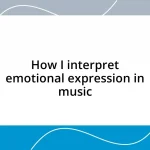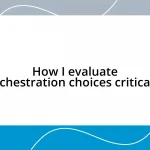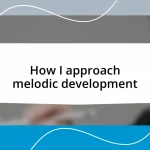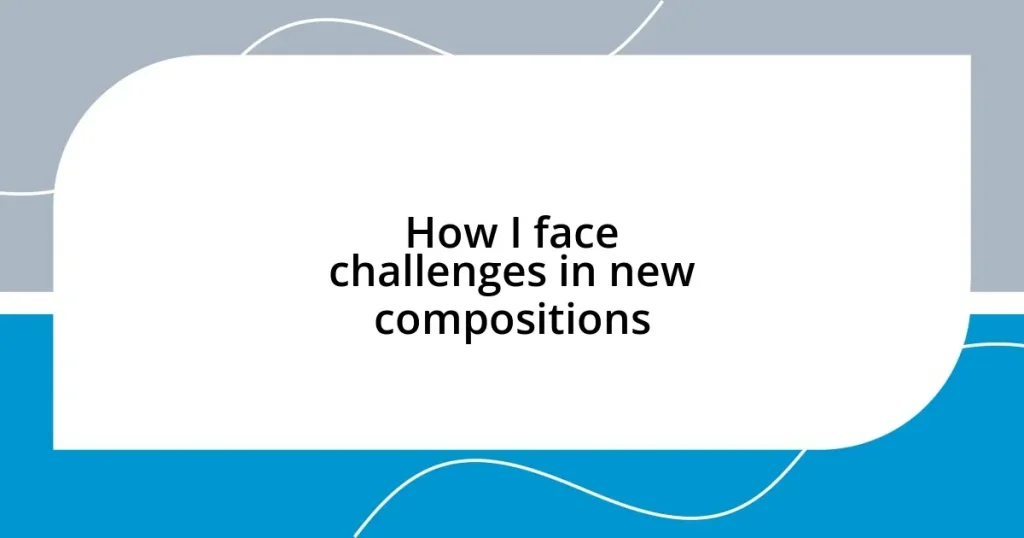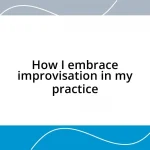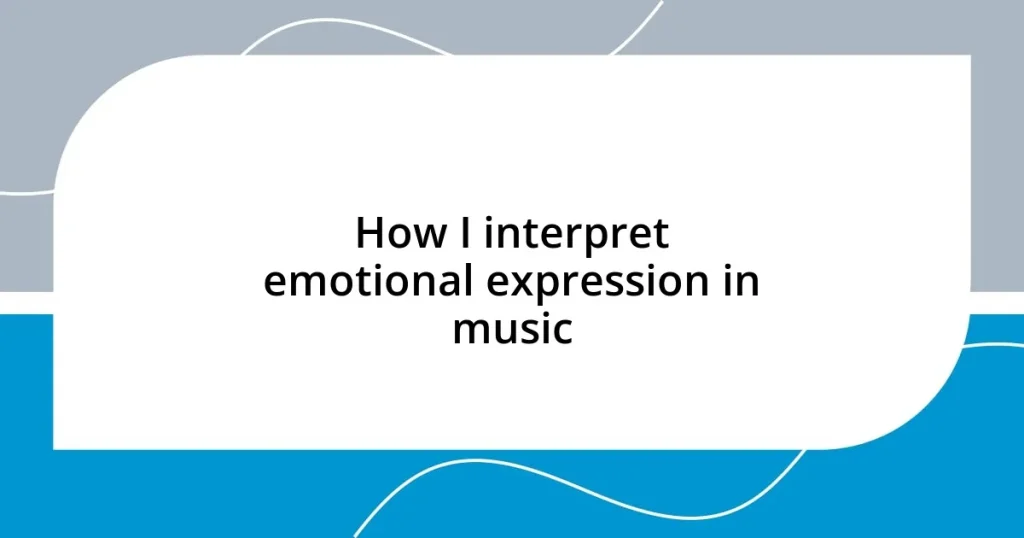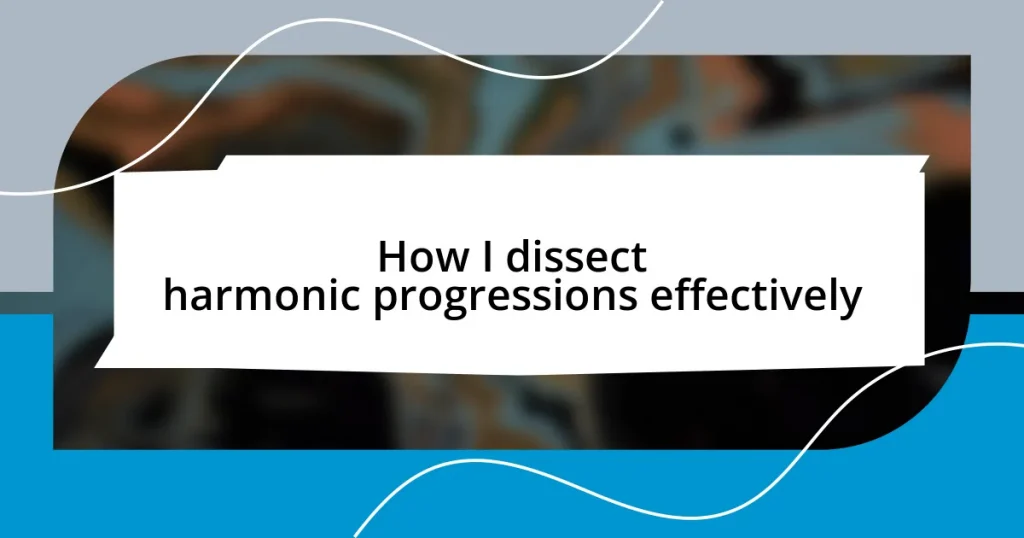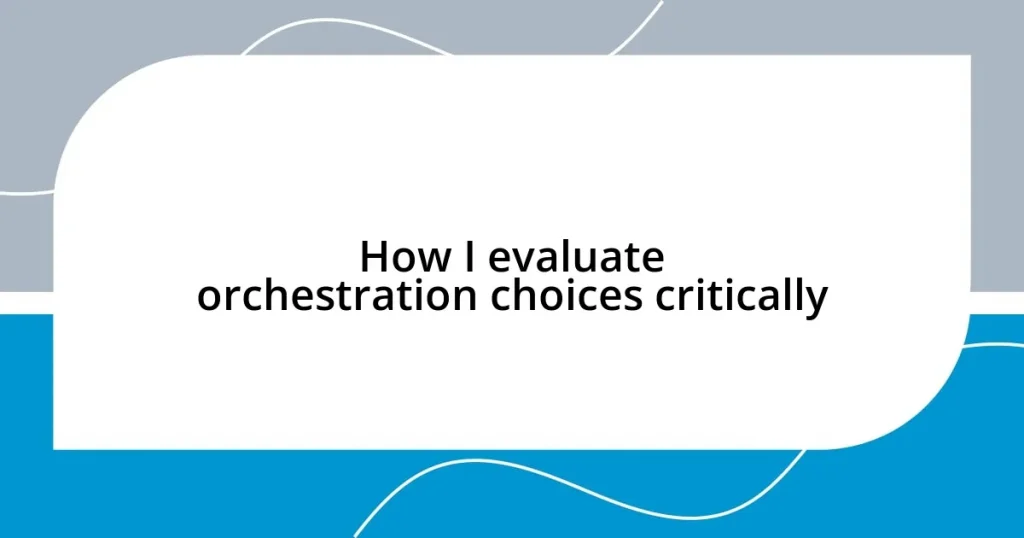Key takeaways:
- Understanding emotional challenges in composition fosters personal growth and a sense of community among writers.
- Identifying personal creative blocks—such as fear and perfectionism—can help in untangling creativity and enhancing the writing process.
- Practical techniques like setting small goals, positive self-talk, and seeking feedback from peers are effective strategies for overcoming self-doubt.
- Embracing adversity as a source of inspiration can transform challenges into opportunities for deeper artistic expression and connection with readers.
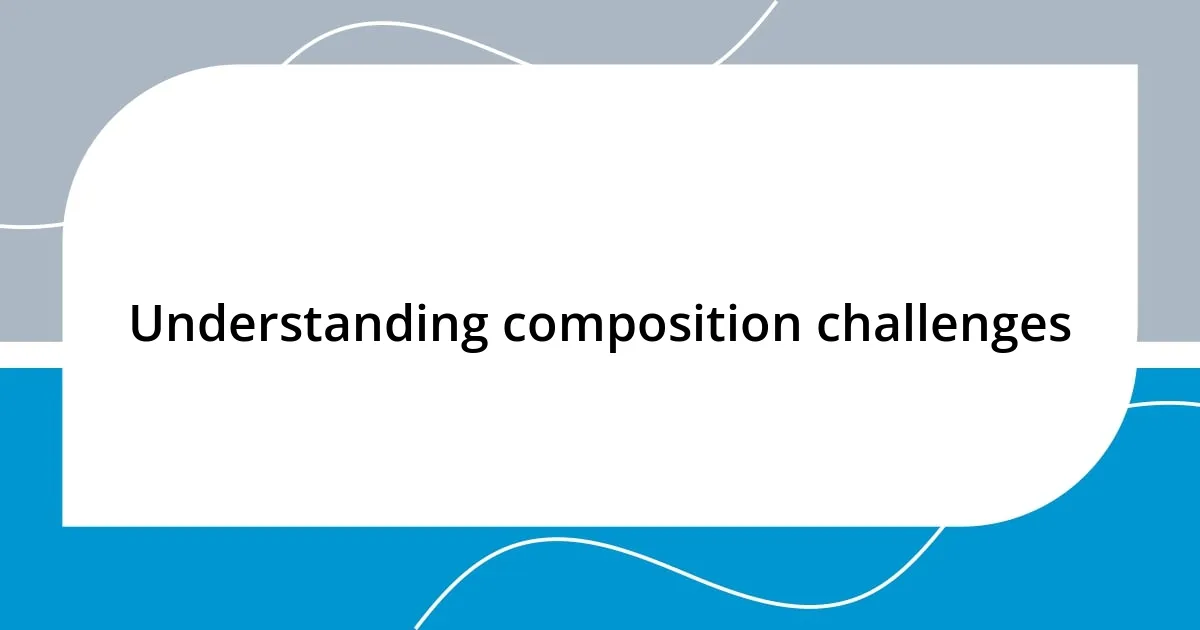
Understanding composition challenges
Understanding composition challenges often starts with recognizing the emotional weight they carry. I remember a time when I was faced with a blank page, and the pressure of expectations began to mount. I questioned—how can I translate my thoughts into words that resonate? That moment, filled with uncertainty, taught me that these challenges are part of a deeper creative journey.
Each composition comes with its own set of hurdles, whether it’s structuring ideas or finding the right voice. When I hit a block, I often reflect on the nature of the challenge itself. What am I really grappling with? For example, I once struggled with a piece that felt deeply personal, and I realized that vulnerability was at the heart of my blockage. Understanding this not only helped me break through but also enriched the end product.
Moreover, recognizing that challenges in composition are universal can be quite liberating. I often share my struggles with fellow writers, and we find common ground in our experiences. Isn’t it comforting to realize that everyone grapples with these issues? Sharing these moments fosters a sense of community and reminds us that facing challenges can lead to profound growth in our writing endeavors.
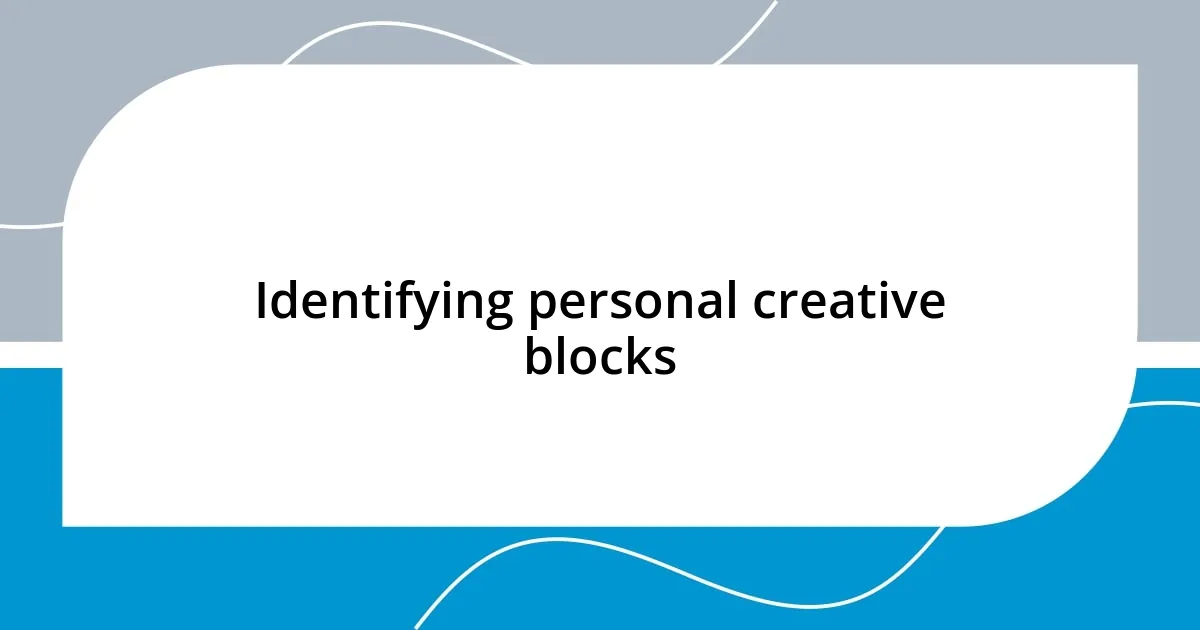
Identifying personal creative blocks
Identifying personal creative blocks requires a moment of introspection. I often find that my blocks manifest in various forms—fear of inadequacy, perfectionism, or even a lack of inspiration. Last month, I faced an unexpected lull in my creativity. It wasn’t just a dry spell; it felt more like an avalanche of self-doubt crashing over me. Taking a step back, I recognized that I was trying to overanalyze my work, which paralyzed my ability to move forward.
To pinpoint my creative blocks, I keep an ongoing list that includes:
– Fear of judgment: Worrying about how others will perceive my work can be paralyzing.
– Overthinking: Getting caught up in details often slows me down.
– Comparisons: Measuring my progress against others can lead to feelings of inadequacy.
– Emotional state: Acknowledging when I’m stressed or overwhelmed helps me see a clearer path.
– Disconnection from purpose: Revisiting why I started writing in the first place can reignite inspiration.
Recognizing these elements is crucial for me to untangle the knots in my creativity. Each time I confront these blocks, I learn a little more about myself, making the creative process feel like an evolving journey rather than an insurmountable task.
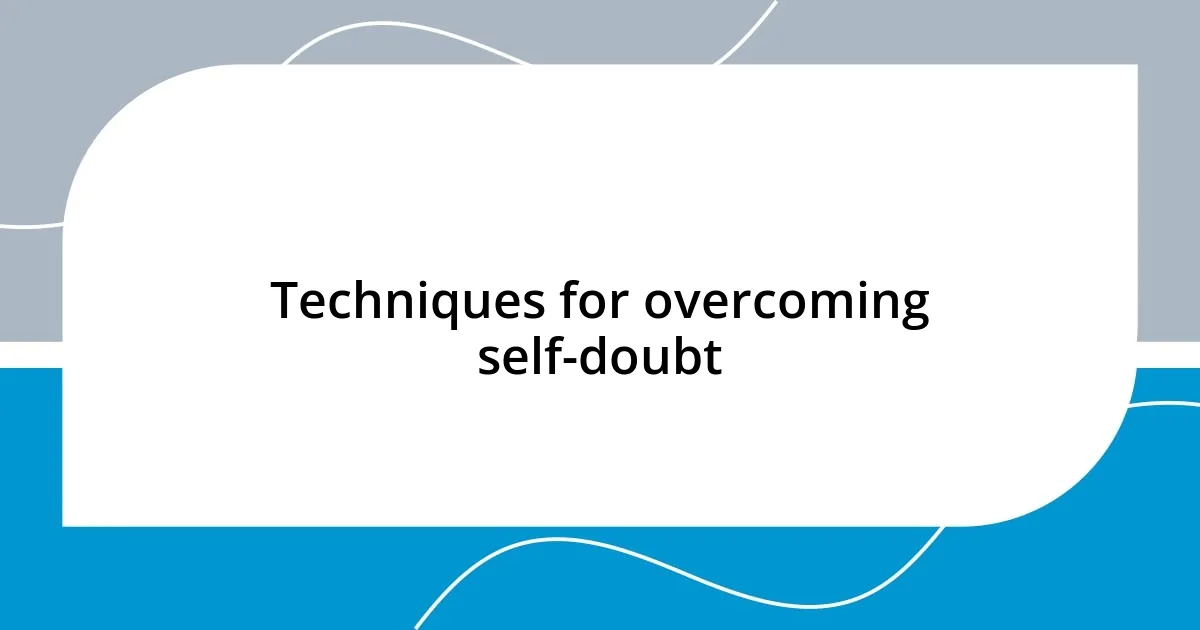
Techniques for overcoming self-doubt
When it comes to overcoming self-doubt, I find that practical techniques can truly make a difference. One of my go-to strategies is setting small, achievable goals. Instead of aiming to complete an entire piece at once, I break it down into manageable chunks. For instance, during my last project, I focused on drafting just one paragraph a day. This approach helped me regain a sense of accomplishment, which slowly chipped away at my overwhelming self-doubt.
Another technique I often employ is positive self-talk. I vividly remember an instance when I was preparing for a presentation of my work. I caught myself thinking, “This won’t impress anyone.” Recognizing this harmful mindset, I shifted my narrative and tried affirmations like, “I have valuable insights to share.” Almost immediately, I felt a shift in my confidence. It’s amazing how changing that internal dialogue can pave the way for creative breakthroughs.
Additionally, I’ve discovered that seeking feedback from trusted peers can be incredibly liberating. One evening, I shared an incomplete draft with a fellow writer who offered constructive criticism instead of judgment. Their insights not only validated my struggles but also opened my eyes to perspectives I hadn’t considered. Engaging with others reminds me that self-doubt often stems from isolation and that collaboration can transform anxiety into growth.
| Technique | Description |
|---|---|
| Setting Small Goals | Break down projects into manageable tasks to regain a sense of accomplishment. |
| Positive Self-Talk | Shift negative thoughts into affirmations to boost confidence and creativity. |
| Seeking Feedback | Engage with peers for constructive criticism that can clarify doubts and inspire improvement. |
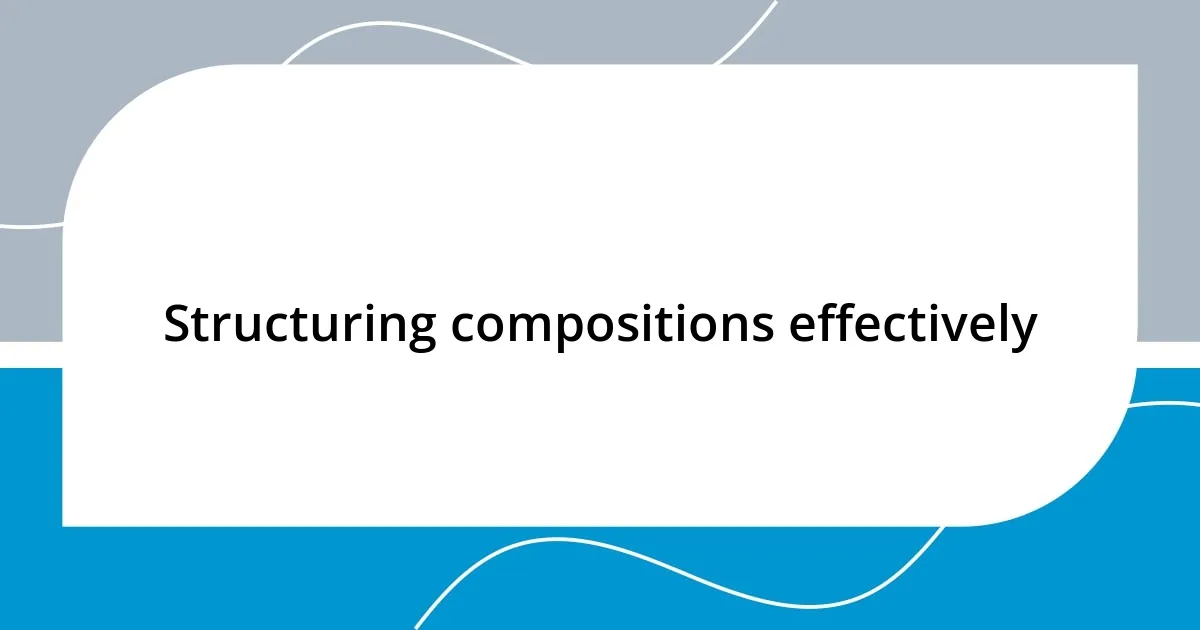
Structuring compositions effectively
Structuring compositions effectively can feel like building a house—each section must have a solid foundation. I start with a clear outline, breaking down the main ideas before diving into the writing process. For example, while working on my recent essay about creative processes, I sketched the introduction, body, and conclusion to ensure my thoughts flowed logically. This technique not only keeps me organized but also prevents that overwhelming sense of chaos that can sometimes take over.
One day, I experienced a moment of clarity about why structure matters. As I attempted to connect multiple ideas, I realized that without a clear roadmap, I was getting lost in my own narrative. It was frustrating. I asked myself, “What is the main point I want to convey?” This question turned out to be pivotal. I then grouped my thoughts around key themes, which transformed a convoluted mess into a coherent and focused narrative.
Additionally, I often play around with the order of my points. For instance, during a writing workshop, I experimented with starting my piece in the middle of the action rather than the typical beginning. It was refreshing! Not only did it hook my peers right away, but it also breathed life into the structure. I found that unconventional approaches can sometimes yield the most effective engagements. How have you structured your work recently, and did it enhance your message?
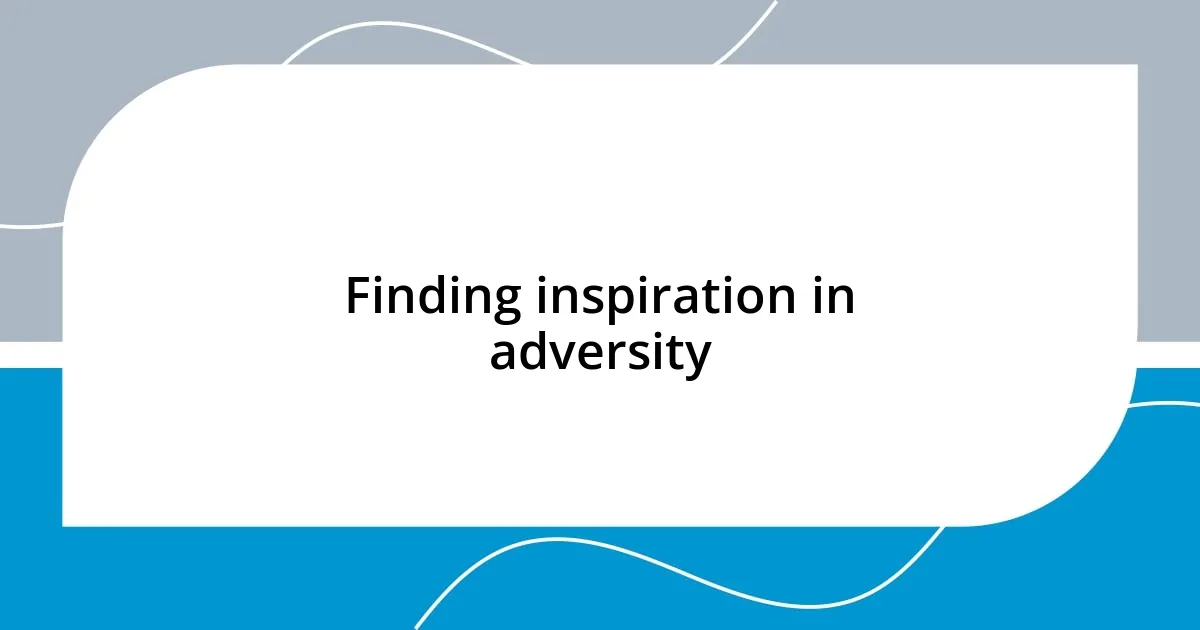
Finding inspiration in adversity
Finding inspiration in adversity has always been an intriguing journey for me. I recall a particularly challenging writing period after a personal loss. Instead of retreating into despair, I poured my emotions onto the page. Those raw feelings became the heart of my next story. The experience taught me that hardship can fuel creativity, transforming pain into profound art.
Another instance stands out when I struggled with writer’s block during a significant career transition. Faced with uncertainty, I decided to write about my fears and doubts. That act of vulnerability turned my challenges into a relatable narrative, resonating with readers who were facing their own struggles. It was empowering to realize that writing about adversity not only helped me heal but also connected us all in shared human experience. Have you ever found a silver lining within your struggles?
I’ve also learned to view obstacles as opportunities for growth. Once, during a difficult workshop, feedback felt more like a setback than a help. However, I chose to embrace that criticism and turned it into motivation. By revisiting the piece with fresh eyes, I discovered new depths and angles I hadn’t considered before. In embracing adversity, I often find not just inspiration but a better version of my work—each challenge, a stepping stone toward creativity.
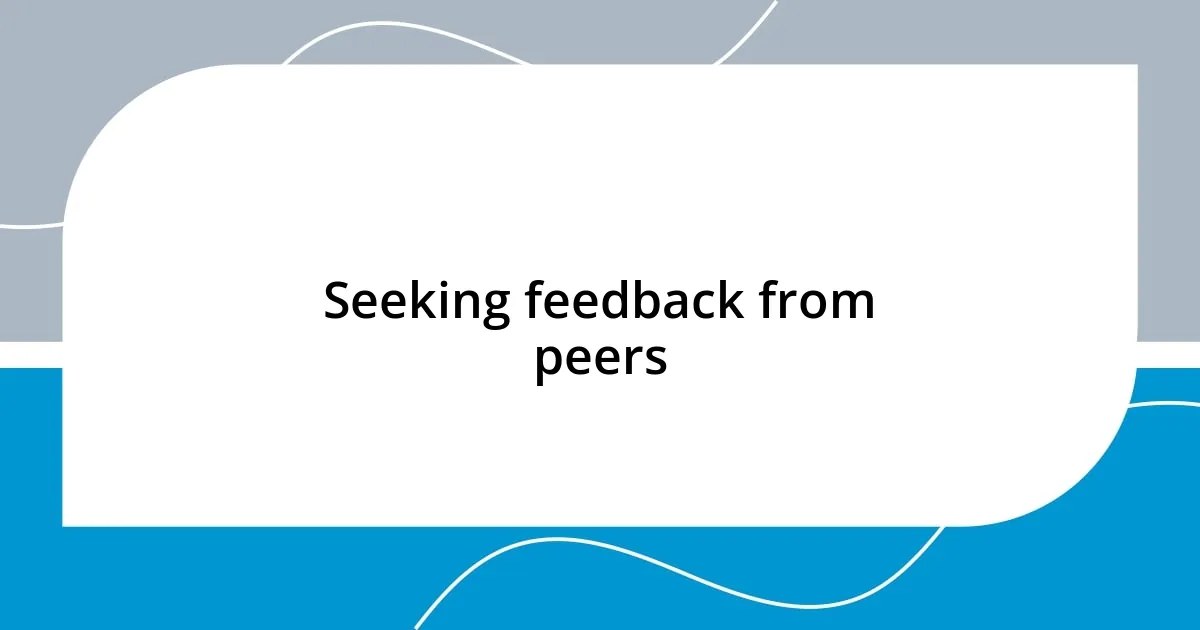
Seeking feedback from peers
Seeking feedback from peers is one of the most valuable tools in my writing journey. I can still vividly recall a time I presented a draft to a group of fellow writers. Their insights opened my eyes to perspectives I hadn’t considered, revealing gaps in my reasoning that I was blinded to. It made me wonder, how often do we really stop to listen effectively to those around us?
In another scenario, I shared a particularly emotional piece about my experiences with anxiety. The feedback I received included both praise and constructive criticism that truly resonated. I felt invigorated by the honest dialogue—it reminded me that vulnerability can forge deeper connections, and that can only enhance my writing. Have you ever felt that rush when someone genuinely engages with your work?
Moreover, I’ve discovered that feedback is most beneficial when it’s specific. Simply hearing “this is good” doesn’t help me grow, but comments like “I love how you described that scene, but maybe explore the character’s inner thoughts more” truly elevate my writing. Engaging with peers not only sharpens my compositions but also fosters a sense of community. Do you seek out feedback, or do you find yourself hesitating? I urge you to take that dive; the rewards are often transformative.
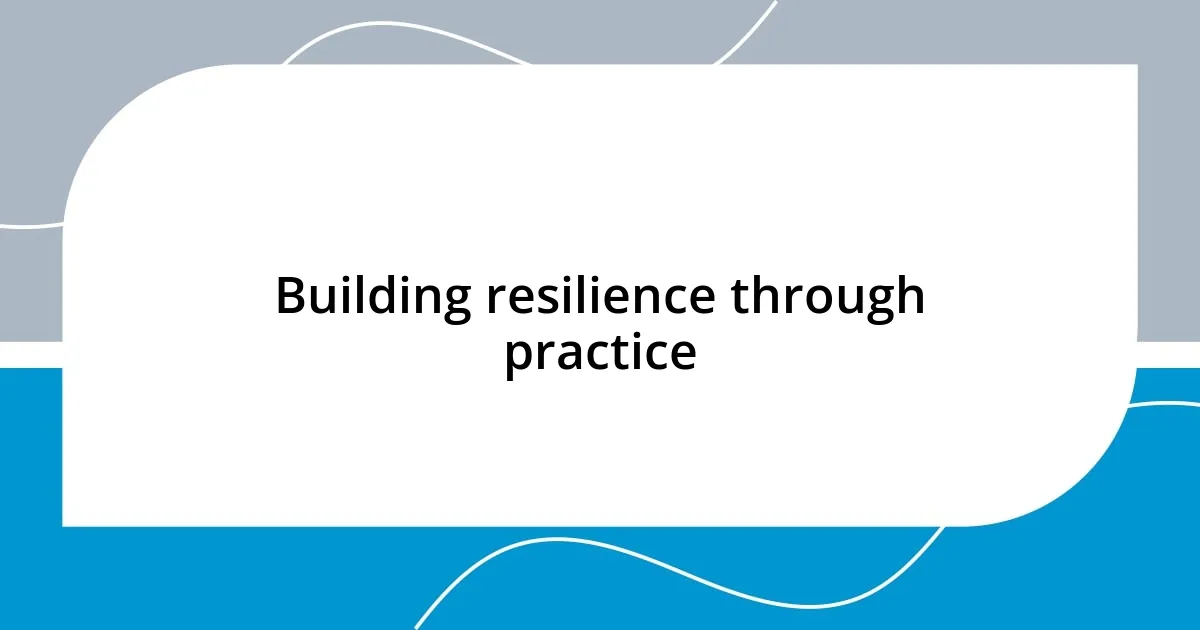
Building resilience through practice
Building resilience through practice is something I’ve come to cherish in my writing. There was a time I felt overwhelmed by multiple deadlines, leading to panic instead of productivity. To combat this, I implemented a daily writing ritual, even if it was just 15 minutes. Slowly, I noticed that consistency helped me not only meet my deadlines but also reinforced my belief in my creative abilities. When was the last time you acted intentionally to build your skills?
I recall another episode where my draft was rejected multiple times. Each rejection stung, but instead of wallowing in disappointment, I started viewing them as lessons. I would dissect the feedback, seeking patterns in what needed improvement. This process not only revitalized the original piece but also contributed to my growth as a writer. Ultimately, I learned that resilience flourishes in the face of repeated challenges. Have you ever turned a setback into a catalyst for personal growth?
Just the other day, I faced a particularly tricky passage that bogged me down for hours. Rather than allowing frustration to win, I decided to tackle the passage from a different perspective. I described the scene during a quiet moment in my favorite café, letting the ambient sounds flow into my writing. The result was a breakthrough that reignited my excitement for the piece. It made me realize that practice isn’t just about perfection; it’s about exploration and joy. How do you approach tough spots in your work?

